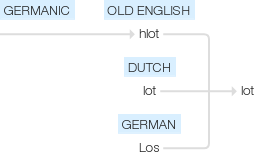Lot
Old English hlot (noun), of Germanic origin; related to Dutch lot, German Los . The original meanings were lot (sense 3 of the noun) and (by extension) the sense ‘a portion assigned to someone’; the latter gave rise to the other noun senses. The pronoun and adverb uses date from the early 19th century.
wiktionary
From Middle English lot, from Old English hlot(“portion, choice, decision”), from Proto-Germanic *hlutą. Cognate with North Frisian lod, Saterland Frisian Lot, West Frisian lot, Dutch lot, French lot, German Low German Lott, Middle High German luz. Doublet of lotto. Related also to German Los.
etymonline
lot (n.)
Old English hlot "object used to determine someone's share" (anything from dice to straw, but often a chip of wood with a name inscribed on it), also "what falls to a person by lot," from Proto-Germanic *khlutom (source also of Old Norse hlutr "lot, share," Old Frisian hlot "lot," Old Saxon hlot, Middle Dutch, Dutch lot, Old High German hluz "share of land," German Los), from a strong verb (the source of Old English hleotan "to cast lots, obtain by lot; to foretell"). The whole group is of unknown origin.
The object was placed with others in a receptacle (such as a hat or helmet), which was shaken, the winner being the one whose name or mark was on the lot that fell out first. Hence the expression cast lots; to cast (one's) lot with another (1530s, originally biblical) is to agree to share winnings. In some cases the lots were drawn by hand, hence to draw lots. The word was adopted from Germanic into the Romanic languages (Spanish lote, and compare lottery, lotto).
Meaning "choice resulting from the casting of lots" first attested c. 1200. Meaning "share or portion of life" in any way, "that which is given by fate, God or destiny" is from c. 1300. Meaning "number of persons or things of the same kind" is from 1570s (compare Latin mala merx, of persons, literally "a bad lot"). Sense of "plot of land" is first recorded 1630s, American English (distribution of the most desirable properties in new settlements often was determined by casting lots), then especially "parcel of land set aside for a specified purpose" (the Hollywood sense is from 1928). The common U.S. city lot was a rectangle 25 feet wide (along the street) by 100 deep; it was so universal as to be sometimes a unit of measure.
Meaning "group, collection" is 1725, from the notion of auction lots. Lots in the generalized sense of "great many" is attested by 1812; lotsa, colloquial for "lots of," is from 1927; lotta for "lot of" is by 1906.
